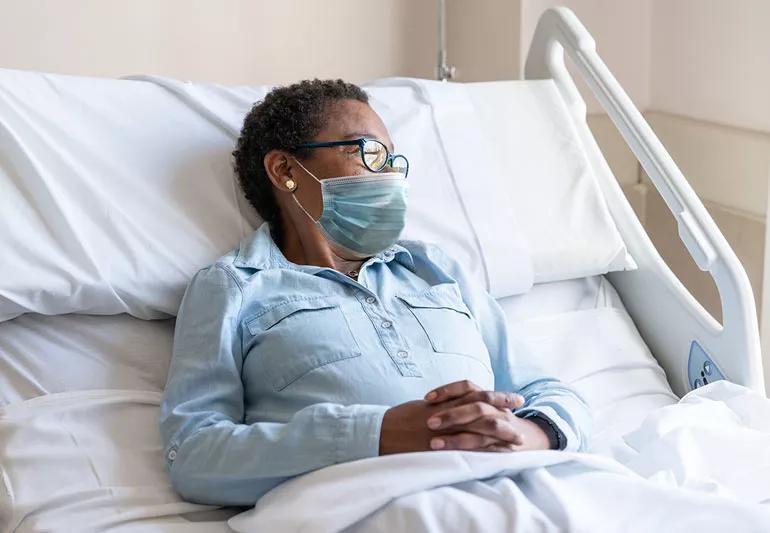Breakthrough cases hit the ‘vaccinated vulnerable’ particularly hard

Image content: This image is available to view online.
View image online (https://assets.clevelandclinic.org/transform/9543b060-1002-45a6-8a8e-dd0a94bffb0f/vacinnatedCovidSick-1277228269-770x533-1_jpg)
vacinnated but sick with covid
Hospitals across the country are reporting overwhelming numbers of people diagnosed with COVID-19. The unvaccinated fill the vast majority of intensive care unit beds. Have you wondered who is filling the rest?
Advertisement
Cleveland Clinic is a non-profit academic medical center. Advertising on our site helps support our mission. We do not endorse non-Cleveland Clinic products or services. Policy
That’s a group known as the “vaccinated vulnerable,” says internal medicine specialist Amy Teleron, MD, who treats people hospitalized for COVID-19.
“The vaccinated vulnerable are those patients that have received the vaccine but they have underlying conditions that make them more vulnerable to still getting an infection that may still be severe,” she explains.
Let’s learn more about this group.
The vaccinated vulnerable includes a wide range of people, starting with older adults (particularly those age 65 and above). The list also includes:
A vaccination against COVID-19 offers protection against the virus, but it doesn’t mean you won’t get it. Breakthrough infections — infections in people who are vaccinated — do sometimes occur.
The good news? Overall, people who are vaccinated are less likely to be infected, notes Dr. Teleron. And if someone does experience a breakthrough infection, their illness is typically milder without the need for hospitalization or ICU care.
Advertisement
Vaccinations also help reduce the spread of the virus, which safeguards your family, friends, colleagues and community.
People with chronic medical conditions (such as those listed above) may not have as robust of an immune response to vaccines. The COVID-19 vaccine, however, helps protect them against severe disease and death.
Given that those who are vaccinated have a lower chance of getting COVID-19, the unvaccinated crowd poses a far greater risk to anyone who falls in the “vulnerable” category, says Dr. Teleron.
She encourages everyone to get vaccinated or — if you have gotten your vaccine — to sign up for a booster.
“We’re lucky that we have vaccines available to us, so please do it to protect yourself,” stresses Dr. Teleron. “But if you’re not convinced by that, please do it to protect those that you love – your parents, your grandparents, your children, those that have chronic medical conditions and those that cannot get vaccinated.”
Advertisement

Sign up for our Health Essentials emails for expert guidance on nutrition, fitness, sleep, skin care and more.
Learn more about our editorial process.
Advertisement
The short answer: It’s complicated, but the basic care precautions still prevail, like washing your hands and isolating if you’re sick
They can feel like a typical headache or a migraine headache, but the pain can last for weeks to months
Any large social gathering — from a family birthday party to an indoor music concert — has the potential to spread serious infection
It’s important to connect with a healthcare provider, get quality sleep and balance your activities with your energy levels
Just like the flu, COVID-19 will continue to evolve every year
The duration varies, but symptoms can linger for a few days up to a couple weeks or more
Vaccination is best for prevention, but if you get sick with COVID-19, treatments are available
The virus lives best in humans, but it can last on hard surfaces, like doorknobs and railings
Type 2 diabetes isn’t inevitable with these dietary changes
Applying a hot or cold compress can help with pain
Pump up your iron intake with foods like tuna, tofu and turkey